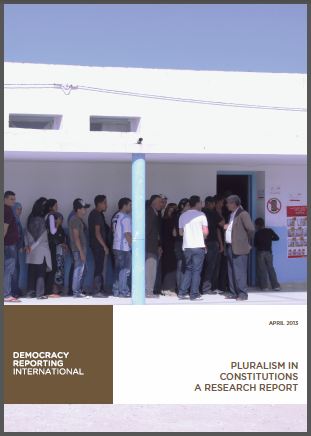Pluralism in Constitutions - a research report, DRI - 2013
This research report: Pluralism in Constitutions was published in April 2013 by Democracy Reporting International DRI.
Political pluralism, which allows for the peaceful expression of different interests, beliefs and demands, is an essential feature of a democracy. Constitutional arrangements should guarantee a degree of pluralism. International human rights obligations include many guarantees for pluralism, however they merely define an "outer limit" or minimum standards which protect pluralism.Within this framework, constitution drafters have numerous design choices, which are consistent with international human rights, but which may be less or more favourable to pluralism.
This report assesses which elements in a constitution typically enhance pluralism and provides numerous comparative examples.The recommendation of this report is, however, not to adopt the most "pluralism-friendly" constitution. Constitution makers must consider other objectives than pluralism, such as political stability. A highly pluralistic constitutional set-up could work against stability, for example, if power becomes too dispersed. Instead the study should help constitution-makers to think through which parameters are relevant for pluralism and tomake an informed decision on the degree to which they want to promote guarantees for pluralism. A comprehensive view of pluralismin a constitution can also help constitutional negotiations and trade-offs. For example, if constitution-makers disagree about the electoral system, those who fear that small parties will not be represented under a given system may be accommodated if there is a degree of de-centralisation which provides for meaningful representation at the sub-national level as compensation.
Methodology: To be practically applicable, the study lays out in general terms the relevance of a constitutional design option to the question of representing pluralism and then quotes provisions from a variety of existing constitutions to illustrate in concrete constitutional wording how an option is described. Within its limited scope, the study does not evaluate constitutional provisions in detail and does not explore practice or interpretation of a given provision by constitutional courts. It is understood that similar provisions can work very differently in different contexts. The study quotes many constitutions, often on the basis of translations.
The report is also available in Arabic

Comments/Questions?